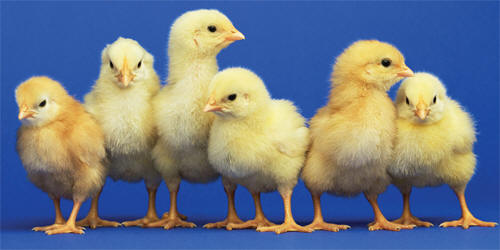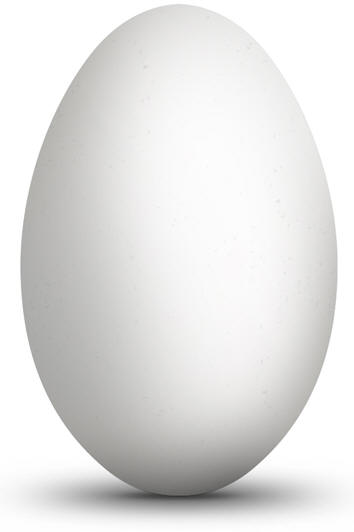|
About Pasture Raised Poultry
Industrial/conventional vs. “cage free” vs. “free range” vs.
“organic”
vs. pasture raised? What’s it all mean?!
With so many different claims on egg labels
it can be difficult to appreciate what it all means, but we all
intuitively know that animals raised in their natural
environment – in our case, the pasture – the happier they are,
and the better they perform. Your
conventional egg in the supermarket comes from a factory of
thousands of hens crammed so tightly together in cages that they
can’t even open their wings and can barely turn around, choking
on fecal dust twenty four hours a day. From “farms” using
medicated feed to keep the sick animals alive and trick them
into becoming a barely functioning machine, with artificial
lights and periodic starvation to jolt their bodies into laying,
and mutilating their beaks so that they won’t cannibalize each
other from going crazy in that kind of environment.
“Cage free” and “free range” are simply
terms meant to hide the fact that they are only slightly better
than conventional factory farms. The birds are crammed together
in long sheds.
Able to walk, still medicated,
still mutilated.
“Allowed access to the outside” is how the USDA defines
“free-range.” This inadequate definition means that producers
can, and do, label their eggs as “free-range” even if all they
do is leave little doors open on their giant sheds, regardless
of whether the birds ever learn to go outside, and regardless of
whether there is good pasture or just bare dirt or concrete
outside those doors!
Our pasture raised hens spend their entire lives outside (except
for a brief 3 week infancy period under a heat lamp), able to
express all of their simple, natural behaviors: gossiping,
sunbathing, dust baths, worm hunting, meticulously cleaning
themselves feather by feather, laying the best eggs ever,
sprinting, perching, clucking, establishing the pecking order,
playing, napping, flapping their wings, drinking out of puddles
when it rains, pecking and moonwalking (how they scratch up the
ground looking for snacks)!
The term “organic” is not comprehensive enough to be used to
describe our eggs. The word is considered a legal term requiring
certification. But the certification only requires that the
chickens be fed organic feed and not be medicated. It says
nothing else about how they are raised or what kind of life they
have. Most “organic” eggs in the supermarket should actually be
called “industrial organic” since they practice the same
production methods as factory farms, in giant sheds, only with a
different “organic” corn based feed.
Our hens’ feed is intentionally free of GMOs (genetically
modified organisms) – removing it even further
from the industrial-chemical food system and creating the
shortest possible food chain from farm to fork. It is made by
Buxton Feed, a small, family run feed mill just off Highway 26
toward the coast. 100% GMO-free - consisting of organic corn and soy and locally sourced peas, wheat and
barley grown without pesticides.
The outdoor lifestyle of our flock combined with the highest
quality and environmentally conscious feed positions our eggs
well beyond the organic standard. They’re pretty much the best
eggs you can get in every possible way.
Nutritional info, benefits of pasture raised
Most of the eggs currently sold in supermarkets are
nutritionally inferior to eggs produced by hens raised on
pasture. Testing has found that, compared to official U.S.
Department of Agriculture (USDA) nutrient data for commercial
eggs, eggs from hens raised on pasture may contain:
Mounting Evidence
•
In 1974, the British Journal of Nutrition found that pastured
eggs had 50 percent more folic acid and 70 percent more vitamin
B12 than eggs from factory farm hens.
•
In 1988, Artemis Simopoulos, co-author of The Omega Diet, found
pastured eggs in Greece contained 13 times more omega-3
polyunsaturated fatty acids than U.S. commercial eggs.
•
A 1998 study in Animal Feed Science and Technology found that
pastured eggs had higher omega-3s and vitamin E than eggs from
caged hens.
•
A 1999 study by Barb Gorski at Pennsylvania State University
found that eggs from pastured birds had 10 percent less fat, 34
percent less cholesterol, 40 percent more vitamin A, and four
times the omega-3s compared to the standard USDA data. Her study
also tested pastured chicken meat, and found it to have 21
percent less fat, 30 percent less saturated fat and 50 percent
more vitamin A than the USDA standard.
•
In 2003, Heather Karsten at Pennsylvania State University
compared eggs from two groups of Hy-Line variety hens, with one
kept in standard crowded factory farm conditions and the other
on mixed grass and legume pasture. The eggs had similar levels
of fat and cholesterol, but the pastured eggs had three times
more omega-3s, 220 percent more vitamin E and 62 percent more
vitamin A than eggs from caged hens.
•
The 2005 study Mother Earth News conducted of four
heritage-breed pastured flocks in Kansas found that pastured
eggs had roughly half the cholesterol, 50 percent more vitamin
E, and three times more beta carotene. |
DoodleDoo Flock Share Pastured Eggs Delivered Fresh |
©Copyright 2013 - All Rights Reserved Worldwide - DoodleDoo Farm (503) 332.7792 eMail Us


